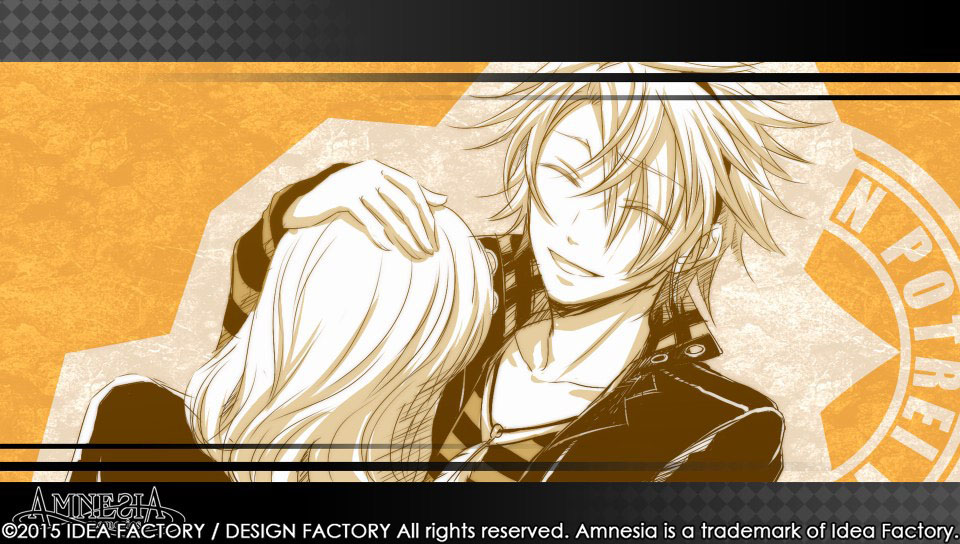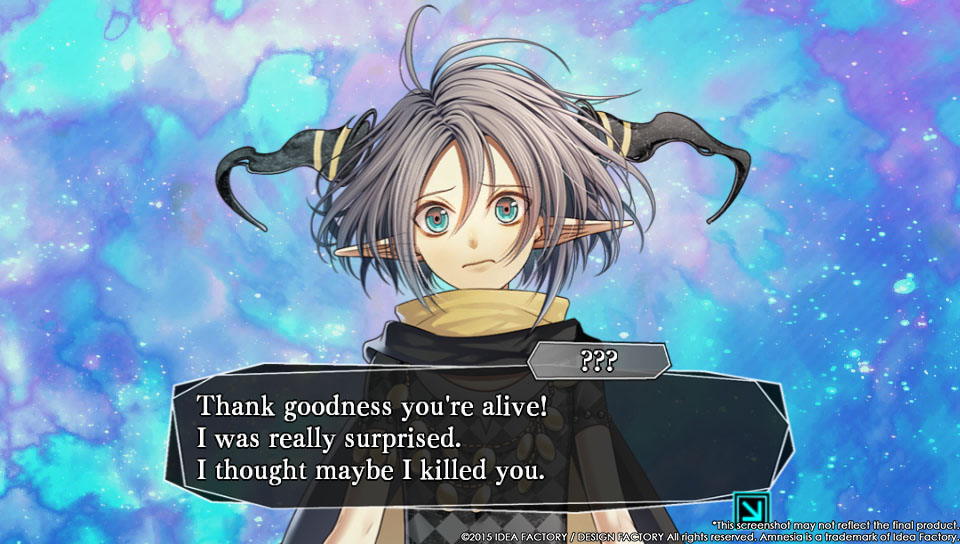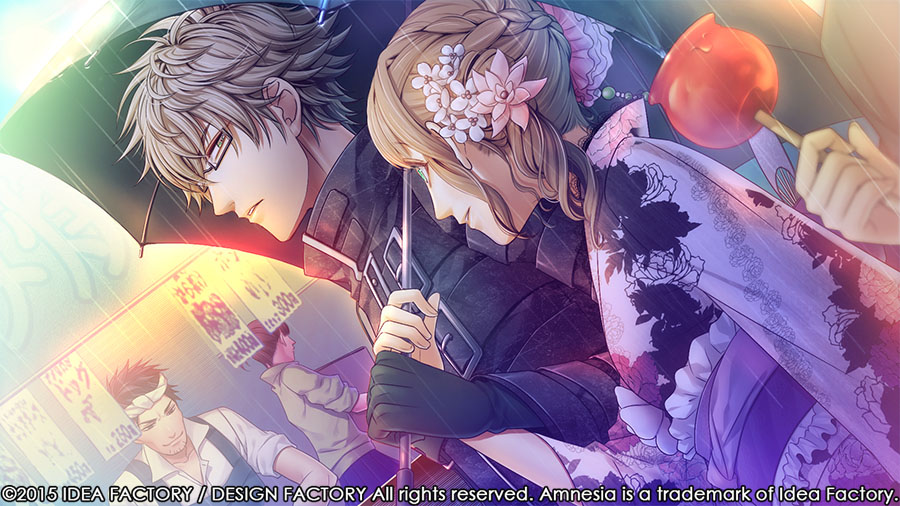Originally released in 2013 in Japan and 2015 internationally, Amnesia: Memories is undoubtedly an otome classic. It continues its long-standing relevancy thanks to a plethora of re-releases, now including an English-language foray onto the Nintendo Switch. Nearly ten years later, Amnesia holds strong as one of the genre’s defining titles, with a distinct mystery and thriller approach to its storytelling and a slew of imperfect yet uniquely charming love interests. Some slight hiccups in consistency and technical execution peek through but are easy to overlook when considering the game’s high points as well as its age.
Amnesia’s protagonist is a nameable college student who wakes up on August 1st without any memories. The cause for her amnesia is Orion, a spirit who collided with her consciousness. Together they seek to unlock the protagonist’s missing memories, but this is no lighthearted romp. Right away, Orion warns the protagonist that if anyone notices that she lost her memories, people may try to take advantage of her—and the narrative doesn’t skimp on this idea. Amnesia features intriguing mysteries and thriller elements in most of its routes. Shin’s focuses on uncovering the truth behind an attempt on the protagonist’s life at a mountain resort; puzzle pieces like the characters’ relationships to each other weave together to keep players guessing about who was responsible, all while avoiding even more danger.
Toma’s route delivers one of the otome genre’s best antagonists. Tiny behaviors on Toma’s part cleverly hint at his deviousness, such as taking the protagonist’s keys when leaving her alone in her own apartment, and they build up spectacularly. The scene where the protagonist must hide her phone and turn it off without Toma noticing before he makes a call to locate it might as well have been plucked straight out of a horror game with how their tension leaves players shaking. The game’s usual “Affection,” “Trust,” and “Suspicion” parameters—how much the protagonist likes the route’s love interest, how must she trusts him, and how much the love interest suspects the protagonist is behaving oddly, respectively—are already unique components that enforce Amnesia’s darker tone. In Toma’s route, they are even joined by a “Doubt” stat, further pushing the sense of fear, suspense, and secrecy that Amnesia excels at.

Yet the Doubt parameter feels like it could have been used more throughout the game, including the hidden route and even in Ikki’s. Ikki’s route has a smidge of mystery surrounding the love interest’s dedicated fan club, but because they’re also involved in Toma’s route—and are much more dangerous there—the stakes aren’t nearly as high and the mystery is far less engaging as a result. Ikki’s supernatural powers that indirectly resulted in the creation of said fan club also could have contributed to his route’s intrigue, yet, despite both the protagonist and Orion expressing clear disdain towards Ikki’s playboy behavior at the start of his storyline, the Doubt parameter is conspicuously absent.
Instead of suspense, Kent’s route has math—frightening to be sure, but tonally quite different from the rest of the game. His awkward behavior and earnest attempts at improving his overtly logical attitude and lack of communication make him one of otome’s sweetest love interests but leaves Amnesia with two routes that don’t have quite the same mood as the other three. While it may offer a bit of reprieve from the game’s usual suspense, it’s not as if any one route comprises entirely of thriller elements. Instead, the overall lighter nature of Ikki and Kent’s routes are stark enough compared to the others so Amnesia is possibly the only otome game where my favorite love interests and my favorite routes don’t coincide.
Across all routes, the protagonist rarely speaks through dialogue or thoughts. Instead, Orion takes on the role of the game’s narrator. A practically silent protagonist has disadvantages in terms of character writing, and the convention appears less and less in recent otome titles. But this remnant of a bygone era isn’t without its positives, either. In Amnesia’s case, Orion is a joy to welcome into the story: on a sillier and sweeter level, his adorably stylized facial expressions (reminiscent of classic kaomoji) and sliding his sprite across the screen when appropriate highlight his mannerisms.
There are almost too many Cute Orion Moments to count: his wide-eyed stare with a ticking sound effect as he tries to piece together just what Ikki’s about is incredibly endearing, and even moreso when the ticking ends and a timer ring goes off, prompting Orion to share his conclusions. And when the cast gets reintroduced on the game’s secret route, Orion popping in from the top of the screen, floating upside-down, with an exasperated expression on his face is more than enough to lighten the mood.

When it’s time to move into serious territory, Orion is a surprisingly effective voice of reason. When playing what is essentially “Problematic Boyfriends: The Game,” it’s not unusual to fear that the narrator will justify every wrongdoing—but Orion doesn’t disappoint. He frequently insists that the game’s men should treat the protagonist better than they do, and Orion is outright worried to leave her with some of them. When he does, it’s out of respect for the protagonist’s wishes, precisely because her decisions don’t always align with what Orion thinks, ensuring they remain separate entities—characters all their own.
In reality, Orion doesn’t “talk over” the protagonist as much as one would guess, especially considering the latter is usually so silent. Although some of the heroine’s thoughts can naturally be inferred by the player, Amnesia offers a pleasant middle-ground of sorts to allow her a semblance of a voice: the game has only slightly fewer than a bajillion choices throughout its routes. As a result, the protagonist develops a skeletal sense of “character” despite her striking lack of dialogue; the nearly endless choices the player must make build the protagonist up and provide a framework for her personality. There are even rare occasions where there’s a “choice” with only one option to choose, further lending to the sense that the player truly is controlling the protagonist and giving her a proper voice.
This voice can also be quite drastic from route to route: the choices available to respond with vary considerably, adding an extra layer of intrigue to the system. It’s especially notable how, in the secret route, players must choose the sillier, more teasing responses to get the best ending, compared to other routes where being more demure or even being more steadfast are the best options. Amnesia’s heroine shows surprising depth, even if only through personality.

Unfortunately, it’s never quite clear what personality—what choices—should work to progress down the player’s desired path. It’s usually very difficult to tell just how much a choice affects the overall parameters, and Suspicion sometimes increasing as a story element and not because of any player choice does not help. Some options don’t even seem to affect the parameters at all. While “bad ends”—those where the heroine dies—can typically be avoided with careful decision-making, it feels nigh impossible to get the love interests’ best endings—bar, perhaps, the hidden route’s—without the use of a guide. That a guide is essentially required to make the most out of the game can take a good chunk of fun out of the experience, since players no longer insert their own “voice” into the game with their decisions but instead feel obliged to follow a guide’s.
This is also somewhat soured by the game’s skip mode. Although it is possible to increase the skip text speed, it’s frighteningly easy to miss in the options menu. Even with the speed increased, which is an absolute necessity since the default skip speed is excruciatingly slow, players still have to press A to answer any phone calls or text messages, as well as use the D-pad to scroll through text messages and press A to exit out of them. Replaying routes to get all the endings becomes a terrible drag without the simple quality-of-life feature of skipping through phone calls and texts, which only further pushes the requirement of a guide, if only to avoid making “mistakes” and limiting the number of replays as much as possible.
It’s a shame precisely because Amnesia’s cast and setup are gripping to the point where players want to explore all the endings, to take in as much as they possibly can. Its drawbacks may reveal its age, but it’s clear that Amnesia’s renown is well-earned. While some plot elements, character tropes, and simple mechanical components also serve to date it, its story and cast make everything worth it. It’s a must-play for any otome fan, with a legacy and cast that rightly won’t be forgotten.


